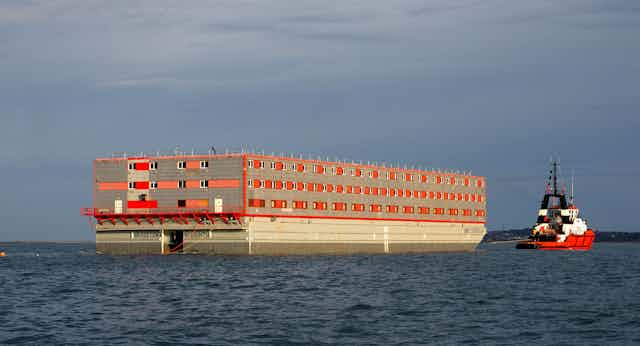The arrival of the Bibby Stockholm barge at Portland Port, in Dorset, on July 18 2023, marks a new low in the UK government’s hostile immigration environment. The vessel is set to accommodate over 500 asylum seekers. This, the Home Office argues, will benefit British taxpayers and local residents.
The barge, however, was immediately rejected by the local population and Dorset council. Several British charities and church groups have condemned the barge, and the illegal migration bill it accompanies, as “an affront to human dignity”.
Anti-immigration groups have also protested against the barge, with some adopting offensive language, referring to the asylum seekers who will be hosted there as “bargies”. Conservative MP for South Dorset Richard Drax has claimed that hosting migrants at sea would exacerbate tenfold the issues that have arisen in hotels to date, namely sexual assaults, children disappearing and local residents protesting.
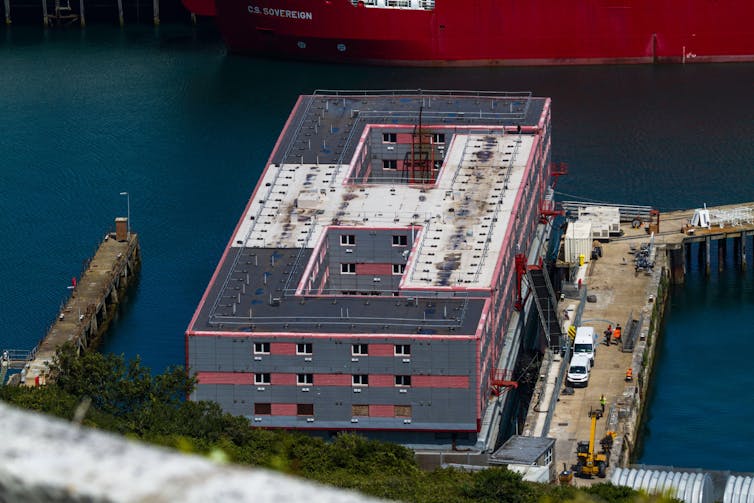
My research shows that facilities built to house irregular migrants in Europe and beyond create a temporary infrastructure designed to be hostile. Governments thereby effectively make asylum seekers more displaceable while ignoring their everyday spatial and social needs.
Precarious space
The official brochure plans for the Bibby Stockholm show 222 single bedrooms over three stories, built around two small internal courtyards. It has now been retrofitted with bunk beds to host more than 500 single men – more than double the number it was designed to host.
Journalists Lizzie Dearden and Martha McHardy have shown this means the asylum seekers housed there – for up to nine months – will have “less living space than an average parking bay”. This stands in contravention of international standards of a minimum 4.5m² of covered living space per person in cold climates, where more time is spent indoors.
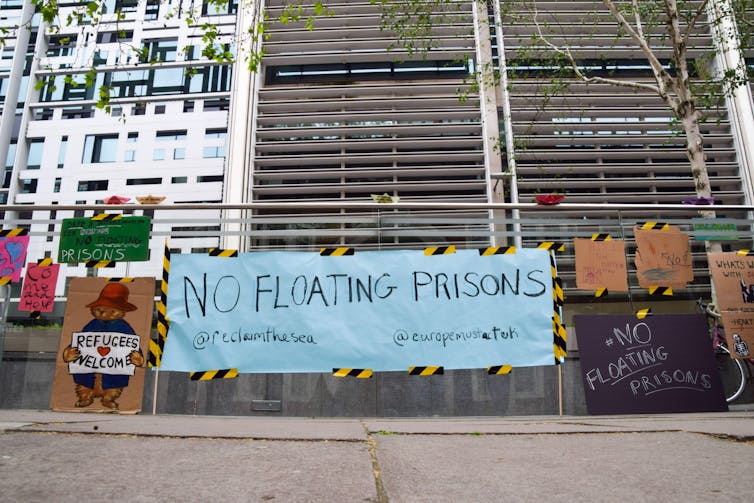
In an open letter, dated June 15 2023 and addressed to home secretary Suella Braverman, over 700 people and nearly 100 non-governmental organisations (NGOs) voiced concerns that this will only add to the trauma migrants have already experienced:
Housing people on a sea barge – which we argue is equal to a floating prison – is morally indefensible, and threatens to retraumatise a group of already vulnerable people.
Locals are concerned already overstretched services in Portland, including GP practices, will not be able to cope with further pressure. West Dorset MP Chris Lode has questioned whether the barge itself is safe “to cope with double the weight that it was designed to bear”. A caller to the LBC radio station, meanwhile, has voiced concerns over the vessel’s very narrow and low fire escape routes, saying: “What they [the government] are effectively doing here is creating a potential Grenfell on water, a floating coffin.”
Such fears are not unfounded. There have been several cases of fires destroying migrant camps in Europe, from the Grand-Synthe camp near Dunkirk in France, in 2017, to the 2020 fire at the Moria camp in Greece. The difficulty of escaping a vessel at sea could turn it into a death trap.
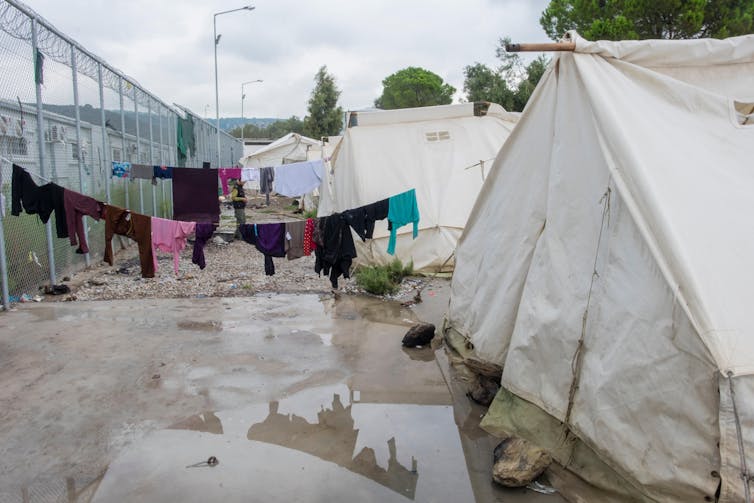
Performative hostility
Research on migrant accommodation shows that being able to inhabit a place – even temporarily – and develop feelings of attachment and belonging, is crucial to a person’s wellbeing. Even amid ever tighter border controls, migrants in Europe, who can be described as “stuck on the move”, nonetheless still attempt to inhabit their temporary spaces and form such connections.
However, designs can hamper such efforts when they concentrate asylum seekers in inhospitable, cut-off spaces. In 2015, Berlin officials began temporarily housing refugees in the former Tempelhof airport, a noisy, alienating industrial space, lacking in privacy and disconnected from the city. Many people ended up staying there for the better part of a year.
French authorities, meanwhile, opened the Centre Humanitaire Paris-Nord in Paris in 2016, temporary migrant housing in a disused train depot. Nicknamed la Bulle (the bubble) for its bulbous inflatable covering, this facility was noisy and claustrophobic, lacking in basic comforts.
Like the barge in Portland Port, these facilities, placed in industrial sites, sit uncomfortably between hospitality and hostility. The barge will be fenced off, since the port is a secured zone, and access will be heavily restricted and controlled. The Home Office insists that the barge is not a floating prison, yet it is an unmistakably hostile space.
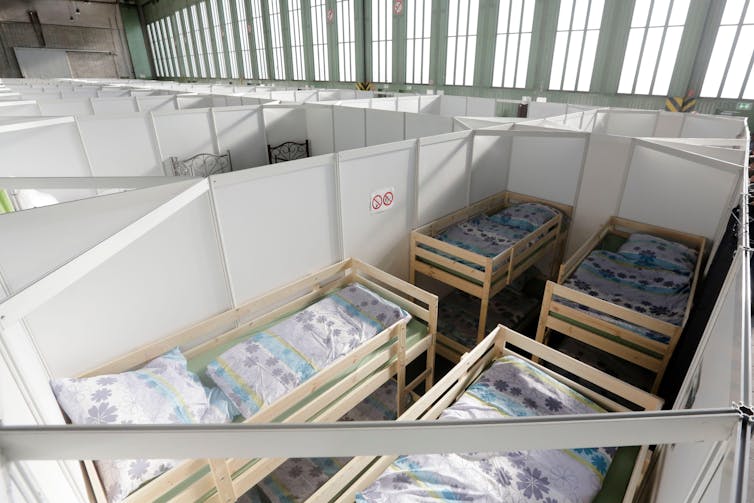
Infrastructure for water and electricity will physically link the barge to shore. However, Dorset council has no jurisdiction at sea.
The commercial agreement on the barge was signed between the Home Office and Portland Port, not the council. Since the vessel is positioned below the mean low water mark, it did not require planning permission.
This makes the barge an island of sorts, where other rules apply, much like those islands in the Aegean sea and in the Pacific, on which Greece and Australia have respectively housed migrants.
I have shown how facilities are often designed in this way not to give displaced people any agency, but, on the contrary, to objectify them. They heighten the instability migrants face, keeping them detached from local communities and constantly on the move.
The government has presented the barge as a cheaper solution than the £6.8 million it is currently spending, daily, on housing asylum seekers in hotels. A recent report by two NGOs, Reclaim the Seas and One Life to Live, concludes, however, that it will save less than £10 a person a day. It could even prove more expensive than the hotel model.
Sarah Teather, director of the Jesuit Refugee Service UK charity, has described the illegal migration bill as “performative cruelty”. Images of the barge which have flooded the news certainly meet that description too.
However threatening these images might be, though, they will not stop desperate people from attempting to come to the UK to seek safety. Rather than deterring asylum seekers, the Bibby Stockholm is potentially creating another hazard to them and to their hosting communities.

